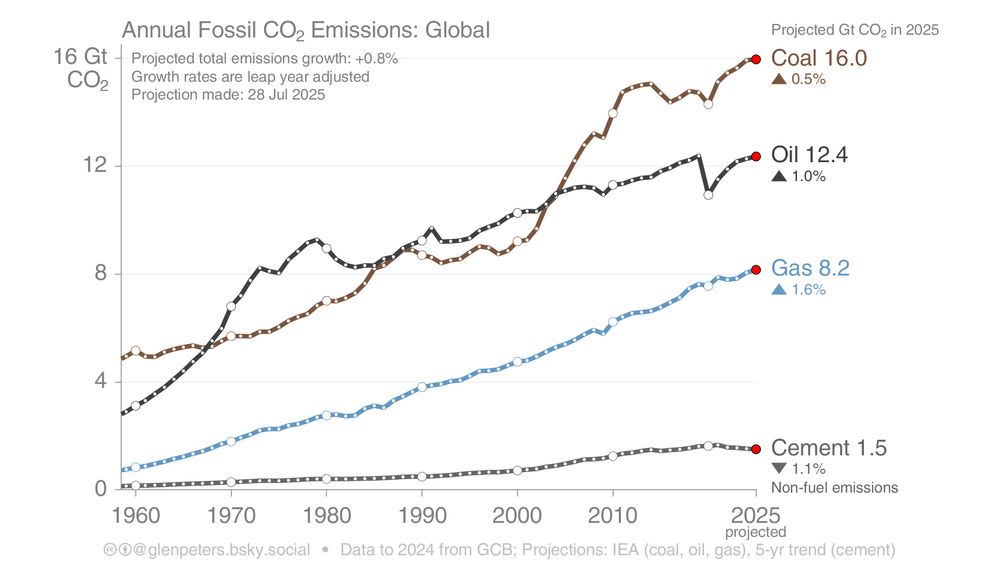The Economist is going big on transformational scenarios at the moment. Three weeks ago it was AI, this week climate tipping points.
These are exactly the sorts of questions economists should be looking at - but often shy away from.
www.economist.com/leaders/2025...
These are exactly the sorts of questions economists should be looking at - but often shy away from.
www.economist.com/leaders/2025...

The shutdown of ocean currents could freeze Europe
When climate change poses a strategic threat, it needs a strategic response
www.economist.com
Reposted by: Hector Pollitt
We're recruiting new associate editors at @climate-policy.bsky.social . Come and join our great team and contribute to our mission to advance an effective response to climate change
climatepolicyjournal.org/2025/08/11/c...
climatepolicyjournal.org/2025/08/11/c...

climate policy is recruiting new associate editors
Climate Policy is a world-leading peer-reviewed academic journal, publishing high quality research and analysis on all aspects of climate policy. Climate Policy aims to make high-quality resea…
climatepolicyjournal.org
Lack of productivity growth is a big deal in the UK. But there need not be a trade-off between productivity growth and net-zero. In fact the two may be complementary (and this can be modelled!). It’s time to change the story.
This drives productivity growth, almost by definition. We get more electricity, more mobility, more services, for lower cost. We can spend more on other things.
There is a critical difference between fossil fuels and new technologies.
We spend more on fossil fuels, we exhaust cheap supplies and prices go up. We spend more on new technologies, we learn and prices go down.
We spend more on fossil fuels, we exhaust cheap supplies and prices go up. We spend more on new technologies, we learn and prices go down.
The paper focuses on two key assumptions that have dominated previous work: 1) green technologies are more expensive; 2) spending on green technologies means less spending on other things. Both are misguided.
Thread on this paper in @climate-policy.bsky.social last month. For so long we’ve heard about the ‘costs’ of reducing emissions. This paper adds to the growing evidence it doesn’t have to be like that.
www.tandfonline.com/doi/full/10....
www.tandfonline.com/doi/full/10....

The effects of low-carbon transitions on labour productivity: analysing UK electricity, heat, and mobility with a techno-economic simulation model
The low-carbon transition is generally portrayed as involving costs to the economy through lower productivity and generating benefits through avoided impacts of climate change. This mainstream econ...
www.tandfonline.com
Recent post on LinkedIn about the importance of interdisciplinary research - and not just for climate change.
It also introduces ICENS lab, which takes a broader perspective.
Thoughts and comments welcome!
www.linkedin.com/pulse/why-in...
It also introduces ICENS lab, which takes a broader perspective.
Thoughts and comments welcome!
www.linkedin.com/pulse/why-in...

Why interdisciplinarity matters
This is a post to introduce ICENS lab, a new interdisciplinary initiative: https://www.linkedin.
www.linkedin.com
by Glen P. Peters — Reposted by: Hector Pollitt, Du Toit, Robbie M. Andrew , and 2 more Hector Pollitt, Du Toit, Robbie M. Andrew, Rupert Read, Brett Christophers
Based on fossil fuel growth rates from the IEA Coal Mid-Year Update, July Oil Market Report, & Gas Market Report Q3, fossil CO2 emissions would grow around 0.8% in 2025, reaching another record high...
We are only half way through the year, but don't build too much expectation for peak emissions.
We are only half way through the year, but don't build too much expectation for peak emissions.

Glad to be finally setting up here! I will mostly be covering ways to improve economics and modelling, especially on climate and energy issues. But expect some previews from the forthcoming book with Jean-Francois Mercure. And my return to blogging...